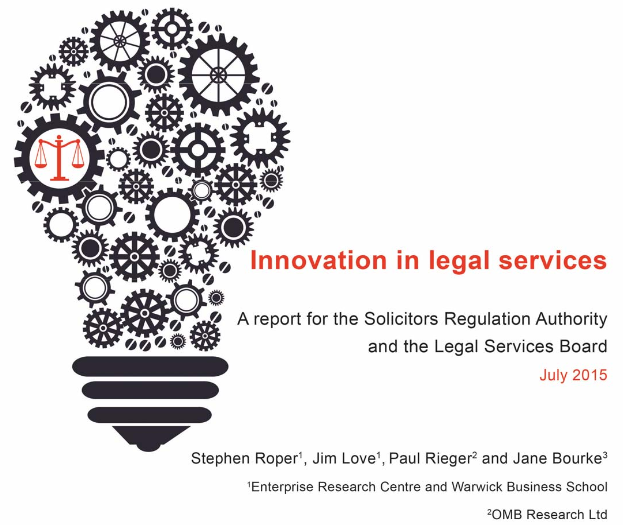|
|
|
You are receiving this email as a member of the Houses of Parliament, the Welsh Assembly or the European Parliament. To unsubscribe, please click here. |
Legal Services Board: Chief Executive's Introduction |
 Welcome to this edition of LSB news.
Richard Moriarty, Chief Executive |
Options for reform of the Legal Services Act 2007 |

In late July, the Legal Services Board published a paper explaining the case for reform of the Legal Services Act 2007 (the Act) and exploring options for such reform.
For more information please see here. |
Legal Regulators rise the challenge of cutting red tape |

The Legal Services Board published in July the collective response of the legal services regulators* to the cross-economy drive to find more opportunities for deregulation. |
Changes in regulation enabling innovation in law firms? |

The largest ever study of innovation in the legal sector, commissioned jointly by the Solicitors Regulation Authority (SRA) and the LSB, suggests that legal professionals are taking advantage of changes in regulation to become more innovative in the organisation and management of their businesses, and in the services on offer to consumers.
The "Innovation in legal services" report and annexes can be found here. |
LSB, LSCP, LeO three-way in Leeds in November |

The Legal Services Board, together with the Legal Services Consumer Panel (LSCP) and the Legal Ombudsman (LeO), is heading to Leeds in November. |
Online divorce: a practical choice |

In late March, the LSB and the LSCP published joint research comparing the consumer experience of using online divorce with more traditional services.
"… getting divorced can be a stressful experience so it's important that the legal process which supports this is as pain free as possible. Consumers taking part in the study and using online providers generally reported quicker, cheaper and less stressful experiences than those using face to face providers. For those going through a reasonably amicable and uncomplicated divorce with a high level of agreement about things like finances, our findings suggest the online route is certainly one to consider.” More information on the research can be found here. |
News update |

The legal challenge against the lawfulness of Quality Assurance Scheme for Advocates (QASA)* is now at an end. The Supreme Court dismissed the latest appeal against the lower courts (High Court and the Court of Appeal) rulings on 24 June. The Supreme Court concluded that the objectives of protecting consumers and other recipients of criminal advocacy services and the sound administration of justice justified the need for the Scheme. It also agreed with the Court of Appeal “that a comprehensive assessment scheme was proportionate, and that the Board was entitled to grant the application of the BSB, SRA and IPS [now CILEX Regulation]”. 
On 3 June the LSB confirmed statutory arrangements agreed with the Office for Legal Complaints (OLC) to enable improved performance reporting. |
Recent Decisions / Reports / Publications in 2015 |
|
3 September |
LSB approves SRA’s application to change accountants' reports and overseas rules |
|
26 August |
LSB approves BSB application to change its complaints regulations |
|
25 August |
LSB approves BSB application for changes to the Cab Rank Rule |
|
24 August |
|
|
13 August |
LSB approves SRA’s 2015/16 practising fee application |
|
29 July |
LSB publishes report on regulation of in-house lawyers |
|
28 July |
|
|
24 July |
Faculty Office 2015 practicing certificate fee approved |
|
7 July |
LSB and SRA publish joint research into the state of play of innovation in the legal services sector. |
|
19 June |
LSB confirms details of statutory arrangements agreed with OLC to enable improved performance monitoring |
|
9 June |
LSB annual report 2014/15 laid in Parliament |
|
22 May |
LSB writes to all regulators asking them to continue to monitor the area of price transparency to ensure good consumer outcomes are secured |
|
14 May |
LSB launches survey of legal services regulators performance |
|
24 April |
LSB approves changes to SRA’s regulations re. the regulation of insolvency practice |
|
27 March |
LSB announces new members of the Office for Legal Complaints |
|
26 March |
LSB publishes its 2015-18 strategy and its 2015/16 business plan |
|
25 March |
LSB issues second report on regulators' progress on diversity and social mobility data collection and transparency. |
|
19 March |
LSB and LSCP issue joint report comparing the consumer experience of online divorce with more traditional services |
|
12 March |
MoJ / LSB announce new appointment to the Board of the LSB |
|
25 February |
LSB publishes update report on the regulatory standards performance of the frontline legal services regulators |
|
Want to get in touch? Legal Services Board |
. |
